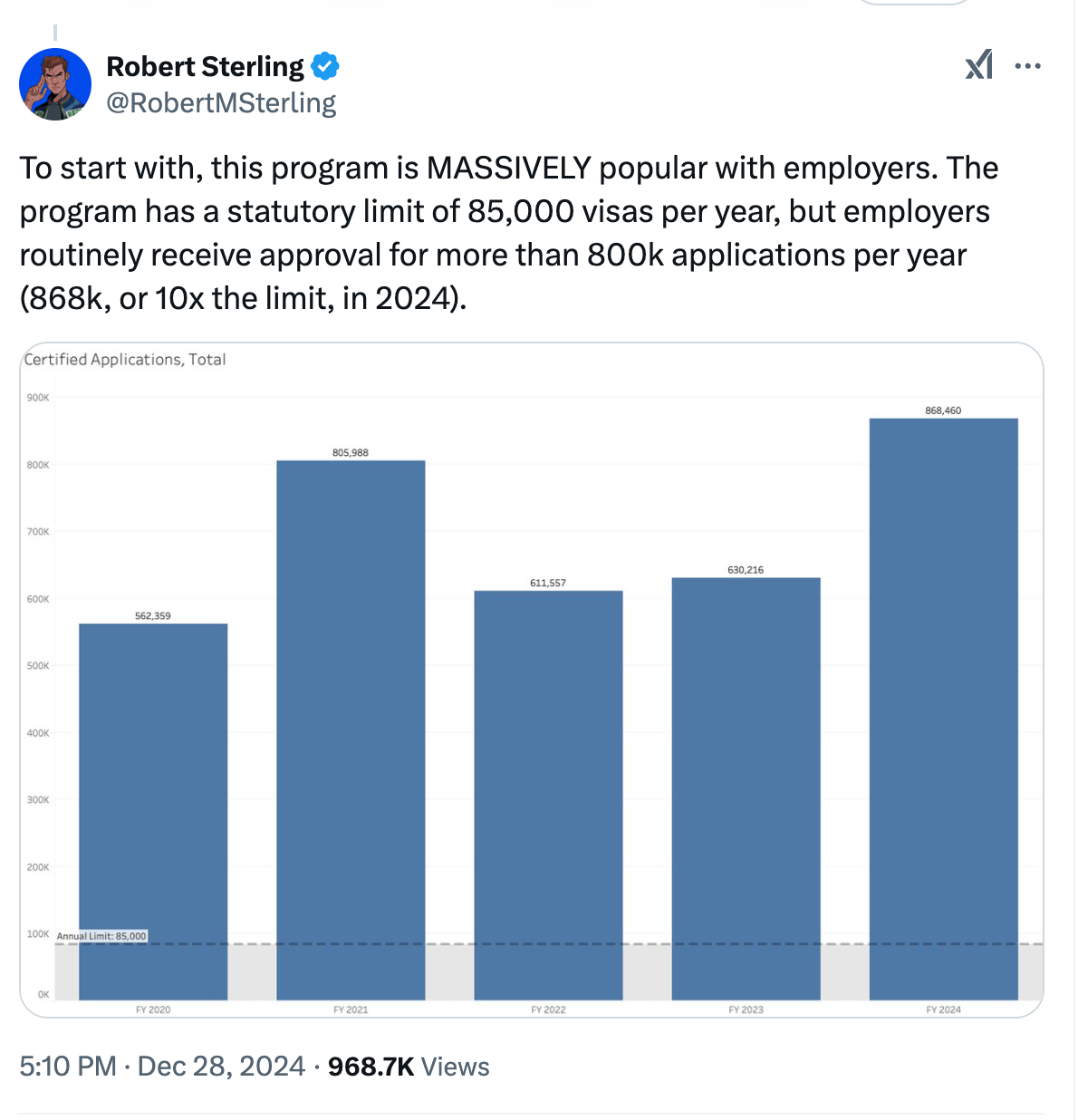The last two weeks have seen a slew of criticisms against the influx of low-skilled Indian tech workers, ranging from the fraudulent to the downright average, into the American jobs market. The linchpin of the controversy were tweets from Vivek Krishnamurthy and Elon Musk defending the practice of importing hundreds of thousands of Indian workers into the U.S. tech industry using the H1B visa. Not only are the numbers several times above what is mandated under H1B rules (capping hires at 85k), but it’s also obvious that these workers are low-skilled (or, at best, mediocre and, hence, filling jobs that average American workers could do with proper training), but they are also suppressing wages as these workers agree to lower salaries. It’s the legal version of what’s happening at the southern border.
https://x.com/RobertMSterling/status/1873174742129361084
Of course, this has led to an outburst from American whites spouting xenophobic hate against Indians, talk that went beyond criticism of the immigration policy and into all-out Indophobia. It’s not surprising, and I’m not at all offended. Everything being posted or tweeted against India—from the sorry state of its infrastructure, its dirtiness and corruption, right down to exposing Indian society for its horrible caste system—is true. All of it. And you can’t argue with what’s true.
For decades, India’s been brewing up the perfect storm of failures, whether it’s in expanding higher education and vocational training, investing in R&D in all fields and in infrastructure. India got here by its own making. There are lot of reasons for it. The corrupt alliance between MPs and unions that stall attempts at land and labor reform, the lack of cohesion between state and federal policies, the innate lack of civic order in Indian society are all drags on development. So, when you got 12 million entering the job market every year and the Indian economy can’t absorb nearly all of them, what do you think is going to happen? It’s like a pressure cooker releasing steam every year. And the valve is called the H1B.
That billionaires grease the wheels for the abuse of the H1B situation is no surprise, but what I’m more fascinated (and disturbed) by are the social and cultural truths about India that this whole kerfuffle has stirred up.
If you search Youtube for videos about the H1B controversy, you’re likely to be served up scores of content exposing India’s corruption, economic and policy failures (check out videos about the apocalyptic collapse of tourism, for example), and all-around horribleness. It’s not hard to find, actually. I found these videos not very helpful because they were too ginned up on hate. They lacked depth and nuance and context. India is a very easy country to pile on. I mean, come on. I’ve been there, I’ve lived there. In many respects, I agree: It’s hellish. But it’s also a lot of other things and not all of them bad.
Anyway, in all my searching, I happened upon two excellent conversations on the subject.
The first was from Keaton Weiss and Russell Dobular from one of my favorite political commentary channels, Due Dissidence.
The second was new to me: It was the Matt Kim channel on Youtube, and I have to say it offers the most honest and open-minded cultural critique of India, Indian immigrants, and the H1B controversy I have so far seen online. Kudos to these two guys, Matt and his co-host Peter, who bring humor, humility, and fair play to the conversation. I’m not saying they’re out there praising India, far from it. As two Asian dudes, they get it right, though.
Peter’s summation about India, where he lived for six months, as a society where both the scarcity mindset and distrustfulness prevail are eminently true, in my opinion. The subcontinent’s long history of famine could partially explain the scarcity mindset and the in-built prejudices of the caste system might do the same for the latter.
Indians have done (and are doing) a lot of soul-searching right now about the society they’ve made. I value a lot of their commentary. But you need an objective partner (in this case, non-Indian members of a fellow immigrant Asian class) to tell it like is.











Share this post